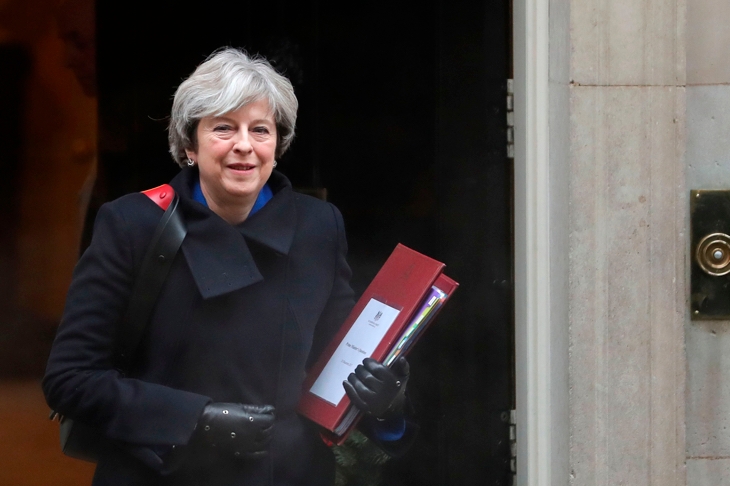The last full year before Britain leaves the EU has been foretold by some as a time of increasingly desperate negotiation. According to this view the government is drifting towards an economically painful Brexit, so consumed by the whole sorry business that it is unable to address any of the country’s other problems. Yet there is no reason why 2018 should turn out this way, and every reason to hope that it will prove to be the year when the Conservatives finally emerge from the tumult of the referendum to achieve other things.
While the deal struck between the government and the EU in December — and the prospect of Britain paying a ‘leaving bill’ of around £40 billion — has offended some Brexiteers, it has transformed the political landscape. With Theresa May’s money on the table, the EU has every incentive to agree to the extensive trade deal – crucially including financial services – which she has demanded in return. There will of course be hiccups along the way, but Britain’s interests are so aligned with those of individual EU member states that no political grandstanding by EU officials is ultimately going to stand in the way of such a deal. The shape of Brexit is now there for all to see – not a ‘hard’ Brexit where Britain cuts itself adrift and has to begin again in its relations with European countries, nor a ‘soft Brexit’ in which we became a vassal state of the EU. Britain will remain broadly in regulatory alignment with the EU but with freedoms we do not enjoy now, foremost of which will be the ability to do our own trade deals with the rest of the world.
The brave thing for Theresa May to do now will be to look beyond Brexit and to create a legislative programme in other areas. With this in mind she should begin with a bold reshuffle of her government. She does not need to by shy about dismissing bland and under-achieving ministers. The security of her position grows by the day. Nearly seven months on from her general election debacle, there is still no obvious successor, no figure who could better command the respect of the Conservative party than she does herself. She is imprisoned neither by the DUP nor by big political reputations within her own Cabinet. She is winning votes by larger margins than her majority. Conservative rebels are unlikely to be so suicidal as to try to bring down the government and usher in a Corbyn administration. Moreover, the economy is growing healthily if unexcitedly; the economic crisis which many Remainers predicted, and quite possibly wanted, has failed completely to materialise.
May is now free to try to answer the question which she has so far spent her premiership unable to answer: what is a Conservative government for? It ought not to be difficult to construct an answer. Universities minister Jo Johnson has already made a start by persuading the Prime Minister to exclude students from net migration targets. As The Spectator has argued before, this will recognise higher education as the successful British export industry it is.
One of the big challenges facing the government, for which we have yet to receive a satisfactory answer, is how to increase the rate of house-building. There is a ready solution which is already being discussed: that local authorities which grant planning permission for large estates be allowed to levy a 20 per cent tax on the uplift in land value which results from that permission — so long, that is, that the authority spends the money on associated infrastructure. This will remove many of the objections against new development: that it will overload roads, schools, hospitals and so on.
This week, it has become clear just how much public anger there is about the state of the railways: where fares – and pay for train-drivers and rail company bosses alike — seems to rise completely out of kilter with the quality of the service being offered. Without a satisfactory response from the government, many are finding Jeremy Corbyn’s solution of renationalisation superficially attractive. But there is a conservative solution which would far better challenge the problems created by the franchising system: to introduce genuine competition on all lines. The reason that rail privatisation has failed to do for rail fares what airline deregulation has done for air fares is that passengers are denied a choice – civil servants decide who runs the trains for years into the future. As could easily have been predicted, rail companies then ruthlessly exploit their local monopolies.
Where Jeremy Corbyn is offering centralised regulatory controls, the government should be offering market solutions – and proper market solutions. In housing as on the railways, the ‘markets’ which Labour condemns are nothing of the sort – they are partial markets compromised by central planning which restricts supply and choice. The economic forces which have brought such value and choice to food shops and clothes shops need to be harnessed for the same purpose in housing and rail transport.
With Labour drifting leftwards to old-fashioned socialism, there is a genuine battle of ideas raging in British politics again. A good Brexit will provide a decent legacy for Theresa May, but to be remembered as one of the country’s better Prime Ministers she is going to have to look beyond the European negotiations and reassert the case for an entrepreneurial, market economy with the state as a facilitator rather than overbearing regulator.






Comments